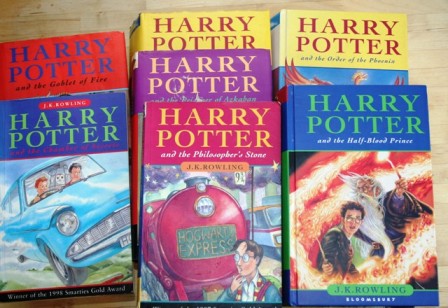
No 11: Harry Potter and the seven books,
by J K Rowling
What are they about?
Redundant as it may seem to explain, given that everyone in the English-speaking world must be presumed to have read the HP books or seen the films, the Harry Potter septology deals with the seven years spent by a lad called Harry Potter at Hogwarts School of Wizard and Witchcraft and the worlds that lie beyond it. Harry and his chums Ron Weasley and Hermione Grainger coexist in the, to us, fantasy world of wizards and the real world of non-wizards, or muggles. The school train to Hogwarts – which seems to be in the Scottish Highlands – leaves from the entirely real Kings Cross railway station but from platform 9¾, which only magical folk can access. Harry does battle with a bad wizard called Lord Voldemort against an increasingly dark backdrop which starts with a Jennings and Derbyshire world of tuck and rugger and ends with a Narnian battle of the species. The books deal with a sweeping array of themes, from the nature of evil to teenage friendships, from family loyalty to the meaning of death. At times a rollicking yarn, a detective story or a dark fable, the books genuinely do offer a good read to a variety of audiences.
What have they got to do with leisure?
At the centre of the early books is a game called Quidditch. Played on flying brooms and involving both scoring goals and chasing a single ball-like object, the seven-man team game has tactics, specialisms, training sessions, complex scoring, a league structure and winners and losers. Harry represents his house, called Gryffindor, against the school’s other three houses and, being some kind of wizarding messiah (by dint of a lightning bolt scar on his forehead) is chosen for the most challenging position – that of “seeker” – in his first year. Author JK Rowling writes Quidditch well, avoiding the trap of overcomplicating the game narrative and focusing instead on the emotions of the participants. She captures the anticipation of the game, the sense of responsibility to perform and the exhilaration of playing well. In the early books Quidditch is all-important to the protagonists and we even see a World Cup but as the wizarding world is threatened by the death-eaters who follow Voldemort the fun goes out of the books and the game with it.
Why should I read them?
Despite the fact that, or perhaps because, they are written for children, the stories move at a cracking pace with rounded characters, convoluted plots and warm humour. For the adult, identifying the themes – Harry as Jesus, for example, and sport as pointless – is a pleasant addition to the clever narrative. And reading a sport as written by someone who doesn’t do sport is always interesting for what it tells us about how they think.
the leisure manager’s library
An occasional series offering a guide to leisure-related literature
